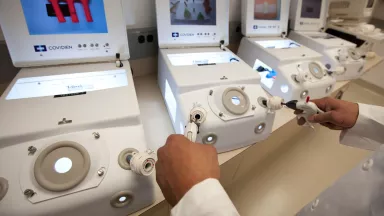Introduction
Our world-renowned orthopedic surgeons and orthopedists are experts in their fields with specialized training to provide the optimal diagnosis and treatment for a range of orthopedic conditions. We are internationally recognized for delivering the highest-quality orthopedic care to our patients.
What is a tendon injury?
Tendons are the tough fibers that connect muscle to bone. Your Achilles tendon, for example, connects your calf muscle to your heel bone. Most tendon injuries occur near joints, such as the ankle. A tendon injury may seem to happen suddenly, but it is usually the result of many tiny tears to your tendon that have happened over time.
Doctors may use different terms to describe a tendon injury. You may hear:
- Tendinitis (inflammation of the tendon)
- Tendinosis (tiny tears in tissue in and around tendon caused by overuse)
Most experts now use the term “tendinopathy” to include both inflammation and microtears. Since for many years most tendon problems were called "tendinitis," your doctor may still use this more familiar word to describe a tendon injury.
What causes a tendon injury?
Most tendon injuries are the result of gradual wear and tear to your tendon from overuse or aging. Anyone can have a tendon injury, but people who make the same motions repeatedly in their jobs, sports or daily activities are more likely to damage a tendon.
What are the symptoms?
Tendinopathy usually causes pain, stiffness and loss of strength in the affected area. The symptoms of a tendon injury can be very similar to those caused by bursitis (a painful condition affecting the small, fluid-filled sacs, called bursae, that cushion the bones), and may include:
- Worsening pain when you use the tendon
- Pain or stiffness during the night or when you get up in the morning
- Redness, tenderness or swelling in the area
- A crunchy sound or sensation when using the tendon
How is it diagnosed?
To diagnose a tendon injury, your doctor will ask you questions about your past health and your symptoms and will do a physical exam. If the injury is related to your use of a tool or sports equipment, the doctor may ask you to show how you use it.
If your symptoms are severe or do not improve with treatment, your doctor may want you to have a test, such as an X-ray, ultrasound or MRI.
How do you treat it?
In most cases, you can treat a tendon injury at home. To get the best results, begin these steps right away:
- Rest the painful area, and avoid any activity that makes the pain worse.
- Apply ice or cold packs for ten to 15 minutes at a time, as often as two times an hour, for the first 72 hours; keep using ice as long as it helps.
- Take over-the-counter pain relievers such as acetaminophen or NSAIDs (such as ibuprofen or naproxen) if you need them, and always only as directed.
- Do gentle range-of-motion exercises and stretching to prevent stiffness.
When can I return to my previous level of activities?
As soon as you are better, you can return to your activity, but take it easy for a while. Don’t start at the same level as before your injury. Build back to your previous level slowly, and stop if it hurts. Warm up before you exercise, and do some gentle stretching afterward. After the activity, apply ice to prevent pain and swelling.
What happens if it doesn’t get better?
If these treatments above don’t help, your doctor may suggest physical therapy. If the injury is severe or long-lasting, your doctor may have you use a splint, brace or cast to hold the tendon still. It may take weeks or months for a tendon injury to heal. Be patient, and stick with your treatment. If you start using the injured tendon too soon, it can lead to more damage.
How can I prevent another similar injury?
To keep from hurting your tendon again, you may need to make some long-term changes to your activities, such as:
- Change your activities or how you do them; for example, if running caused your injury, try swimming some days, or if a certain tool led to the injury, try switching hands or changing your grip.
- Always take time to warm up before and stretch after you exercise.
- If exercise caused the injury, take lessons or ask a trainer or pro to check your technique.
- If your job caused the tendon injury, ask your human resource department if there are other ways to do your job.
Physician Referrals
Montefiore Einstein embraces a collaborative approach.
If you have a patient who could benefit from our services, please reach out.
718-920-2060
Schedule a Visit
Have a general question or concern?
We’re available to help you by phone or email.
• 718-920-2060 • orthofeedback@montefiore.org






